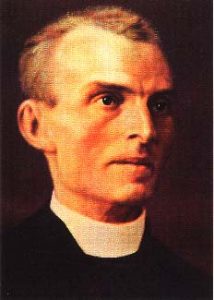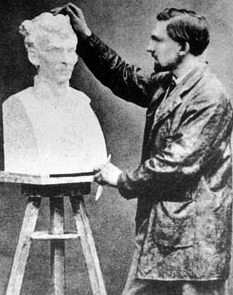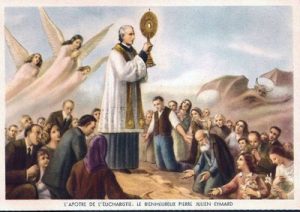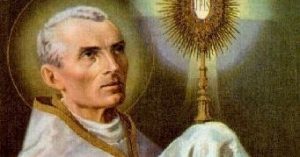
St. Peter Julian Eymard was a priest and founder, and is known as The Apostle of the Eucharist. Peter was born in 1811 in a small town near Grenoble in the French Alps. His father had been a widower who remarried Peter’s mother, and he owned a cutlery shop and an oil press.
Love for the Blessed Sacrament from the beginning
Peter’s mother and step-sister were sincerely religious, and they took him to daily visits for prayer before the Blessed Sacrament. Even as a very young child, he had a strong affection for the Real Presence of Christ in the tabernacle. Peter was an average boy who once dreamed of being a soldier, and loved being an altar boy. He especially enjoyed walking through the village streets in advance of Mass, ringing a bell, as was the custom of calling people to church. As an adolescent, his education was completed, and he began working with his father. Peter knew at a young age that he was called to be a priest, but faced opposition from his father, because he was the only son. He knew that he would have to master Latin, so he began studying it independently. At seventeen, Peter made it clear to his parents that he had no intentions of marrying and was resolved to enter seminary, and they reluctantly agreed.
Ordination to the priesthood

In 1831, Peter entered the Grenoble diocesan seminary and was ordained a priest in 1834. At his first assignments, his parishioners observed that he spent a great deal of time praying in the church and that he was very dedicated to his work.
In 1837, Fr. Eymard requested release from serving in the diocese in order to join the Society of Mary, the Marist order, due to their special devotion to the Virgin Mary. He made his vows at Lyons in 1840, and worked with seminary formation. By 1844 he was chosen to be Provincial, or head of a province of the order, and traveled extensively throughout France, visiting the Marist houses.
New Order with a new charism
While visiting Paris in 1849, Father discovered a group that had established nightly Eucharistic Adoration, a lay group known as the Association of Nocturnal Adorers, which had been established to combat the discord brought on by the French Revolution and its aftermath. Having always had an ardent love for the Real Presence of Christ in the Eucharist, he was deeply inspired to bring the devotion of Perpetual Adoration to his order. His superiors decided against the idea and decided that it was a separate charism from their own. They mutually recognized that Father Eymard had a particular calling and they released him from the order to pursue his mission.
With the help of another priest, Father Eymard petitioned Paris Archbishop de Sibour in 1856, and Perpetual Adoration was approved, thus the Society of the Blessed Sacrament was established. In a small house in a rundown Paris neighborhood, Adoration was begun. The congregation that Father sought to establish had slow and humble beginnings and was opposed by the secular authorities. He was tenacious, however, and with time, vocations to the order arrived. The members of the order focused their entire charism around the importance of the Real Presence of Christ alive in the tabernacle or exposed for Adoration, and the indescribable treasure of spending time with Him there. They especially aimed their efforts at preparing children for First Communion. In 1858, Father had established an order of women who adored perpetually, as well as a lay organization for this purpose. By 1862, the young order had established three houses in France, and Pope Pius IX approved of the Rule the following year.

A young sculptor spent time discerning a vocation with the order, but was advised by Fr. Eymard to follow his artistic gift and use it wisely. The sculptor, Auguste Rodin, made a bronze bust of his former mentor, Fr. Eymard. Father had never had good health, and suffered particularly with migraine headaches, but the stroke he suffered in 1868 robbed him of any remaining strength. He died on August 1 at his hometown at age fifty-seven. His remains were eventually taken to Paris and kept in his order’s chapel.

St. Peter Julian (Pierre-Julien) Eymard was an advocate of frequent reception of Communion decades before it was recommended by Pope (St.) Pius X in 1905, for he recognized the mystical spiritual strength this practice provided for the faithful. He wrote a series of books covering the reasons and wonders of devotion to the Blessed Sacrament. The order he established for women, the Servants of the Blessed Sacrament, still exists for this purpose. It’s first superior, Marguerite Guillot, took the advice of Fr. (St.) John Vianney to place herself under Father Eymard’s direction, because the great Curé of Ars recognized his saintliness.

St. Peter is usually depicted wearing a cope and humeral veil and bearing up the Blessed Sacrament for adoration. He was canonized in 1962 by Pope (St.) John XXIII, and his feast day is August 2.
